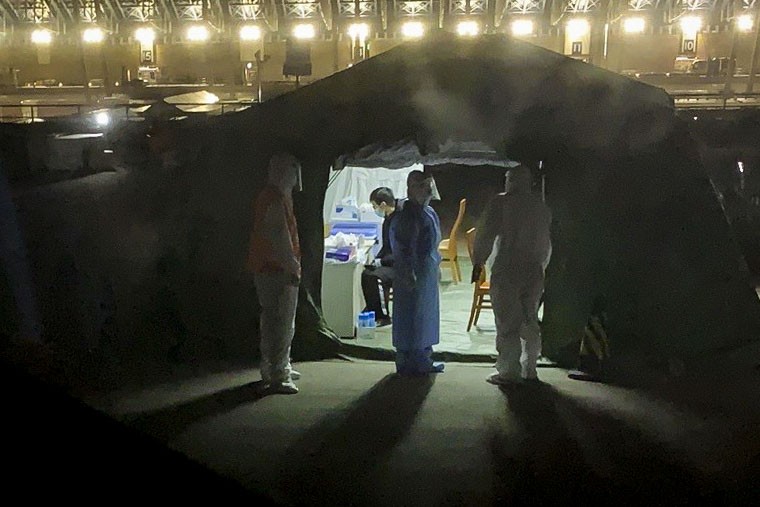University of Minnesota freshman Yunwei Huang spent Friday, her 19th birthday, in a Jiangsu province hotel in China used solely to quarantine those who arrived from out of the country.
Meanwhile, in the same province, University economics senior Shaochen Jin is currently living in a sanatorium in Lianyungang, dealing with jet lag and isolation.
These two University international students left Minnesota earlier this month to escape the growing COVID-19 pandemic in the United States. Under Chinese rule, people who arrive in the nation, even if they are Chinese citizens, must undergo a 14-day quarantine in designated hotels or other public spaces. These measures are to ensure that people coming into China do not spread COVID-19.
For Huang and Jin, living in quarantine and taking University classes online while 13 hours ahead of Minnesota is a unique experience.
On their flight home, both students wore protective masks, gloves and goggles. Huang also wore a hazmat-like suit on board. Though they chose to leave the U.S. on different dates, Huang and Jin traveled the same routes and had similar experiences. Huang and Jin were lucky to make it back to China before flights in and out of the country were sharply cut.
The Civil Aviation Administration of China directed Chinese airlines to maintain only one flight route to any country and limit the number of flights to one per week, according to Reuters.
Before Huang and Jin landed in Shanghai, both of them said they were required to fill out a health declaration form. The form listed a number of symptoms for possible affected coronavirus individuals, such as diarrhea and fever. “False reports and deception will result in criminal responsibilities,” the form reads.
Huang and Jin both went to testing spots in makeshift tents after disembarking the plane. Everyone tested received a full-body disinfection, even down to their shoe soles. During the test, the examiner used a cotton swab to scratch everyone’s throat.
Though both of them tested negative for coronavirus, Jin and Huang still need to be quarantined for 14 days. They were all sent to their home cities by bus – Jin went back to Lianyungang and Huang to Yancheng.

Balancing student life and quarantine
Jin took his first University online class in China on the bus driving to his quarantine location at 12:15 a.m., which is 11:15 a.m. Central Standard Time – 13 hours behind.
“It was pretty dark around me,” Jin said. “I was wearing a mask, and I feel like my American classmates were curious about what I was doing.”
Jin said his professors were accommodating to him and any issues he faced. He said he had trouble logging into Canvas, and One Stop Student Services helped him quickly.
“My professors said they understand my technical issues, wish me to stay safe in China and to not worry too much about the courses,” Jin said.
Huang is taking 19 credits for the spring semester. She talked to her professors and instructors and finished many of the assignments before she went back to China.
“My professors all support me,” Huang said. “They told me to do what I think is the most important thing at the current stage.”
Huang said the only aspect of the transition that she found difficult right now is the time difference. “I felt a little inconvenient,” Huang said. “Due to the time difference, the communication with the professor was not timely.”
Jin and Huang are now living in their quarantined locations, taking and reporting temperatures two times a day while doing assignments for their online courses.
In both quarantine locations, the facilities have group messages for residents to message staff for meals and report their temperatures.
Both said the food provided for them in quarantine was good and had dishes that included shrimp, chicken drumsticks and clams.
“During the meal time, workers will help put your meal on the chair in front of my door and notify me on our group chat,” Jin said. “Our meals are great.”

On Friday, Huang’s birthday, her parents bought a birthday cake and asked the workers in the hotel to bring it to her.
“Perhaps this is the most special birthday of all – first birthday in quarantine,” Huang said in a social media post on her birthday.
Huang’s parents were very happy that Huang got back to China safely, and they bought another cake and invited friends over for a meal to celebrate Huang’s birthday, though she could not be there.
“I have no idea who even blew the candles for me,” Huang said.
Jin and Huang cannot see their parents face-to-face. Huang said she could only talk with her parents through her hotel windows.
“I have been outside of my hometown for about six or seven years, and I didn’t have a strong sense of belonging to my hometown before,” Jin said. “It was not until this pandemic, where everyone needed to band together, that I realize that the hometown identity has always been there.”













